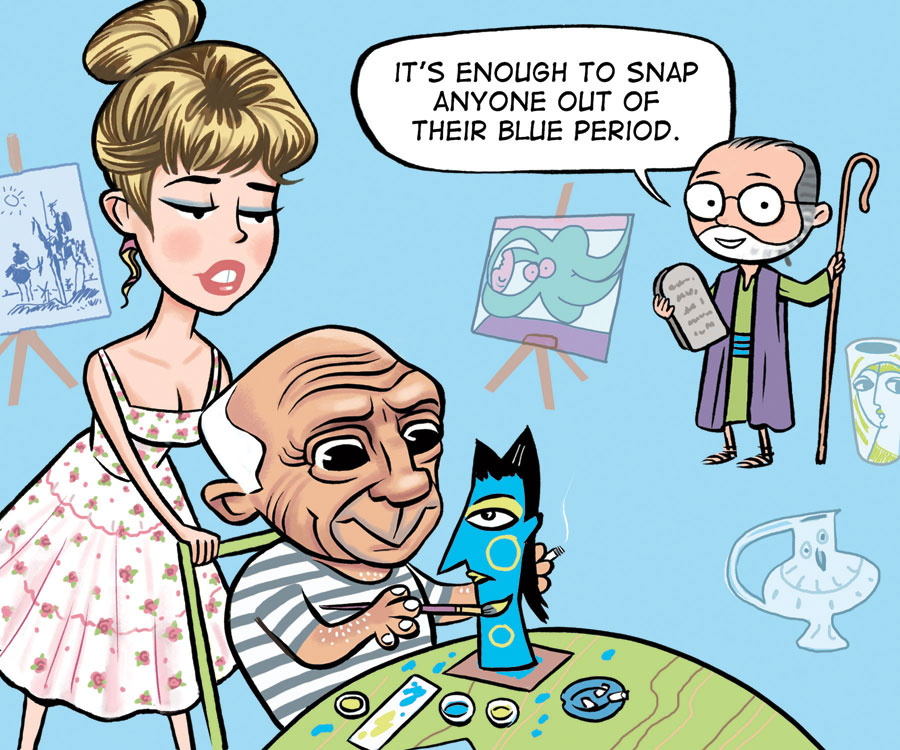Prophet of Zoom: One is the Loneliest Number

Use passion, humour and adventure to escape your lonely planet.
The loss of a long-loved partner is one of the most profound challenges of aging. Many of the emails you send in make that movingly clear. Recently, widowed Zoomer reader and writer Toby Saltzman, for instance, writes that she would love to hear ideas that would help her combat loneliness and feel “poised to enjoy a vibrant new day.” Here are five ideas that might qualify and surprise you.
1. Be a Woman – At Least Do as Women Do. Contrary to popular belief, studies now show that grieving widows don’t suffer most; grieving widowers do. The prime difference? Bereaved women reach out to other people, which society both expects and allows. “By contrast,” says Paul Sandor, a Zoomer reader and professor of psychiatry at University of Toronto and adviser to the Canadian Centre for Men and Families, “the societal expectation for men is they should be strong, so they tend to close in on themselves and, because they’re alone, get despondent and even suicidal.” Bereaved men especially should look outside, not in, says Sandor, forward and not back.
2. The Internet Is Your Safety Net Technology. Today is often called isolating, but for the lonely and grieving seniors among us, it can be the opposite. In 2007, Olive Riley, a 107-year-old Australian, became the world’s oldest blogger (“blobber,” she called it). Over the next year and a half, she posted 74 entries, dozens of YouTube videos and received thousands of planet-wide responses. “It was mind-blowing to her,” her grandson Darren Stone said. “She had people communicating with her from as far away as Russia and America.” Alone in her room, Olive was probably the least lonely person alive. (Thanks to reader John Arnald for calling on us to become more “computer literate.”)

3. There is Love After Death. You Just Might Have to Travel to Find It. A new phenomenon in the travel industry is the marked reduction in the “single supplement” or “premium,” a penalty that solo travellers up to now have had to endure for the great crime of travelling alone. The reason most given by cruise and tour companies is the booming rise in older single travellers, a large number of whom have lost partners. Interestingly, although older widowers remarry much more quickly than widows (actually, at more than double the rate), the majority of older single travellers are female. Regardless, the documented anti-loneliness benefits of new places and new faces are now more affordable than ever. Take advantage, and bon voyage.
4. Be like Picasso – Cultivate the Young. Picasso of course didn’t just cultivate the young – he married them. (The average age gap between the artist and his eight wives and mistresses was 25 years.) But studies show that the company of young people of all ages (matrimonial prospects or not) is beneficial to seniors, especially those who’ve suffered a loss. Visiting children and grandchildren, mentoring, volunteering, anything that lets you interact with young people makes it harder to get lost in yourself. It also reminds you the world contains delight – which the 74-year-old Pablo no doubt felt when visited by a 21-year-old Brigitte Bardot at his studio on the French Riviera in 1956.
5. This Too Shall Pass. Till It Does, Laugh. Bereaved people of both sexes are far more resilient than you might think. A Columbia University study, which followed 1,500 elderly married couples, found that only a quarter of the bereaved became depressed, and half of those recovered within six months. A resilient sense of humour is key. People who can smile when discussing their spouses six months after their loss, report being happier and healthier 14 months later. Even black humour can be a tonic. My own favourite spousal loss line comes from Moms Mabley, the fabulously bawdy octogenarian comic. “People tell you you should only say good things about the dead. He’s dead. Good.”